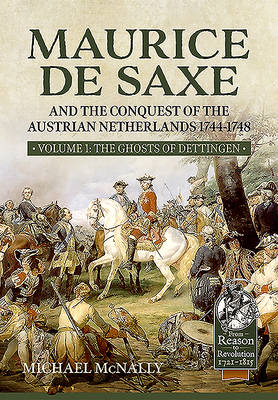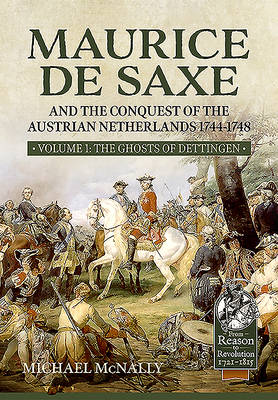
Bedankt voor het vertrouwen het afgelopen jaar! Om jou te bedanken bieden we GRATIS verzending (in België) aan op alles gedurende de hele maand januari.
- Afhalen na 1 uur in een winkel met voorraad
- In januari gratis thuislevering in België
- Ruim aanbod met 7 miljoen producten
Bedankt voor het vertrouwen het afgelopen jaar! Om jou te bedanken bieden we GRATIS verzending (in België) aan op alles gedurende de hele maand januari.
- Afhalen na 1 uur in een winkel met voorraad
- In januari gratis thuislevering in België
- Ruim aanbod met 7 miljoen producten
Zoeken
Maurice de Saxe and the Conquest of the Austrian Netherlands 1744-1748
Volume 1 - The Ghosts of Dettingen
Michael McNally
€ 48,95
+ 97 punten
Omschrijving
The world's first truly global conflict erupted in 1740 over the question as to who would rule the Holy Roman Empire, with Europe divided between those who supported the Archduchess Maria Theresia of Austria and those who endorsed the claim of Charles-Albert of Bavaria. As Europe divided, allies would become enemies and enemies, allies; with the conflict ultimately stretching from Europe, to India and the Americas. Lasting for eight years, the fighting ultimately escalated into an undeclared war between Europe's two superpowers - France and Great Britain - and by its end in 1748, with the loss of her bases at Louisbourg in New France and Pondichéry in India it looked as if France would end up the loser, her influence in Europe curtailed and her plans for colonial expansion dead in the water.
That she avoided this fate was down to the actions of the 'least of Her generals' - Armand Maurice de Saxe - the illegitimate son of King August 'the strong' of Saxony-Poland who, having defeated the Allied invasion of northern France in 1744, used this as a springboard to then conquer the Austrian Netherlands, defeating the Allies in three set piece battles (Fontenoy, 1745, Rocoux, 1746 and Lauffeld, 1747) and numerous sieges. Fortified by Saxe's victories, France went into the eventual peace negotiations in the ascendant and was able to secure a favourable treaty which ensured the return of her overseas colonies.
Using both modern and contemporary sources, Michael McNally sets Saxe's achievement in its true context, not merely choosing to deal with the events of single battles or sieges, but instead illustrating the circumstances which led firstly to his appointment to the command of the French forces in the Low Countries and then the development and execution of a strategic plan which ultimately led to the capture of Maastricht in May 1748, almost three years to the day of his first great victory.
That she avoided this fate was down to the actions of the 'least of Her generals' - Armand Maurice de Saxe - the illegitimate son of King August 'the strong' of Saxony-Poland who, having defeated the Allied invasion of northern France in 1744, used this as a springboard to then conquer the Austrian Netherlands, defeating the Allies in three set piece battles (Fontenoy, 1745, Rocoux, 1746 and Lauffeld, 1747) and numerous sieges. Fortified by Saxe's victories, France went into the eventual peace negotiations in the ascendant and was able to secure a favourable treaty which ensured the return of her overseas colonies.
Using both modern and contemporary sources, Michael McNally sets Saxe's achievement in its true context, not merely choosing to deal with the events of single battles or sieges, but instead illustrating the circumstances which led firstly to his appointment to the command of the French forces in the Low Countries and then the development and execution of a strategic plan which ultimately led to the capture of Maastricht in May 1748, almost three years to the day of his first great victory.
Specificaties
Betrokkenen
- Auteur(s):
- Uitgeverij:
Inhoud
- Aantal bladzijden:
- 304
- Taal:
- Engels
- Reeks:
Eigenschappen
- Productcode (EAN):
- 9781913118976
- Verschijningsdatum:
- 30/06/2026
- Uitvoering:
- Hardcover
- Formaat:
- Genaaid
- Afmetingen:
- 171 mm x 241 mm

Alleen bij Standaard Boekhandel
+ 97 punten op je klantenkaart van Standaard Boekhandel
Beoordelingen
We publiceren alleen reviews die voldoen aan de voorwaarden voor reviews. Bekijk onze voorwaarden voor reviews.









